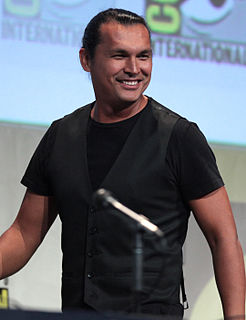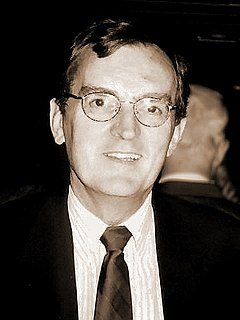A Quote by Salman Rushdie
I think, in a written novel, the way in which you play with the readers' emotion or the way in which you engage the readers' emotions can be very indirect. You could come at it through irony or comedy, etcetera, and you could capture people's sympathies and feelings kind of by stealth if you like.
Related Quotes
I wasn't trying to write a corrective novel - that would just end up tasting like medicine, and I tried to stay away from polemics as best I could. I think that, if anything, Fobbit is my way of showing readers there's another side to war - the backstage of combat, if you will. If you play a word association game with Americans and say "war," what's the first thing that comes to mind? Soldiers running across a battlefield through a hail of bullets, right? Rambo, smoke, explosions. In Fobbit, I hope readers will see something a little different
A newspaper can follow the compulsions, the desires of the readers. Take the English evening newspapers - they are following the readers' desires when they are interested only in the royal family gossip. But even the most objective, serious newspaper in the world designs the way in which the reader could or should think. That's unavoidable.
I think when I started acting it was the first time I got the freedom of expression. I was able to express certain emotions and feelings that I could put into other characters, so it was a good way for me to run away from ho I personally was. I could be a ninja, I could be a pirate or I could be in a play y'know.
David Agus is one of America's great doctors and medical researchers, a man dedicated to improving the health of as many people as he can. Written in a style and format that will truly engage readers, The End of Illness presents a dramatic, new way of thinking about our own health-a way that could lead to greatly improving the quality of life for millions, starting right now.
The funny thing is, nationalism only could have come about in Europe after the invention of printing. You could have this thing that was a book in a vernacular language, and you could imagine there were other readers of this book who you couldn't see, but they were a theoretical union of readers who all use the same language. That is kind of a prerequisite for a national fantasy. You need that thing, and it's a strange thing.
I think our literary tradition has to evolve, has to explore its form and its spirit through writers and thinkers, rather than let the lazy, easy traditional narrative - which is controlled by the publishing industry - roll all over the readers and dominate the market. I think our readers and cinemagoers have been trained to read and watch very mainstream stuff. It's like being given sleeping pills. It sends people to a non-reflective sleep state.
I was interested first of all in trying to capture this myth that was always changing and to create some sort of a master story, some version of the myth that resonated with me, since I could have taken more or less any detail that I wanted or the opposite and try to put that down on the page in a way that I could express from that outset for myself and for our readers what it was that was so magical about [Buckminster] Fuller's way of putting together the world.
Some readers sort of suspect that you have another book that you didn't publish that has even more information in it. I think that readers sort of want to be taught something. They have this idea that there's a takeaway from a novel rather than just the being there, which I think is the great, great pleasure of reading.
I often hear people say that they read to escape reality, but I believe that what they’re really doing is reading to find reason for hope, to find strength. While a bad book leaves readers with a sense of hopelessness and despair, a good novel, through stories of values realized, of wrongs righted, can bring to readers a connection to the wonder of life. A good novel shows how life can and ought to be lived. It not only entertains but energizes and uplifts readers.
I seem to have three categories of readers. The first is nonbelievers who are glad that I am reading the Bible so they don't have to bother. The second group, which is quite large, is very Biblically literate Jews. And the third, which is also very large, is Christians, most of them evangelical. The evangelical readers and the Jewish readers have generally been very encouraging, because they appreciate someone taking the book they love so seriously, and actually reading it and grappling with it.
The sympathies of a well-adjusted person can easily be aroused by the plight of strangers. Indeed, the skillful writer of a novel, a play, or an opera can engage our emotions on behalf of people who are not only strangers to us, but who do not even exist! And a person whose emotions cannot be so aroused is not behaving normally.
If we think about emotion this way - as outside-in, not inside out - it is possible to understand how some people can have an enormous amount of influence over others. Some of us, after all, are very good at expressiing emotions and feelings, which means that we are far more emotionally contagious than the rest of us.







































